- Home
- Pittacus Lore
The Lost Files: Six's Legacy Page 6
The Lost Files: Six's Legacy Read online
Page 6
But I turn around.
I choose vengeance.
CHAPTER EIGHTEEN
I follow him through the halls on tiptoe, careful to maintain my invisibility—I’ve learned enough about my Legacy by now to know that any surprise or break in concentration can cause me to fade back in.
I watch as he ducks into a cell. I sneak in behind him as the door shuts.
Unaware he has company, he walks to the corner of the room and begins to tidy up. I look down. There is blood on the floor, his weapons are out. He has tortured and killed others.
I have never killed a Mogadorian before. Not counting the Mogadorians who died trying to kill me, I have only in my entire life killed a rabbit, and a piken. To my own shock, I realize I am thirsty for murder.
I grab a razor from his desk and approach him. The blade feels good in my hand. It feels right.
I know better than to give him a chance to beg, or plead, to shake me from my resolve. I clutch him from behind and slit his throat with one clean slice. His mouth gurgles and spews blood across the floor, against my hands. He falls to his knees and then bursts into ash.
I feel more alive than I’ve ever felt.
I open my mouth to speak. That’s for Katarina, I’m about to say. But I don’t.
I don’t speak because I know it’s a lie.
That wasn’t for Katarina. That was for me.
I emerge from the complex an hour later, exhausted and struggling to stay invisible as I climb out to the mountaintop, as I run from the mountain to a hill opposite. I have to stop to rest, to adapt to the blinding midday sun.
My translucent skin bakes beneath the sun. I stare at the mouth of the complex, already hard to make out from this distance. I don’t trust my memory, so I pause to memorize its shape, its precise location.
I am sure Mogs have fanned out through the complex, looking for me. And I’m sure they have crawled out of the exit, and are even right now searching through the trees along these hills.
Let them look.
They’ll never find me.
I run for a few miles through trees, until I come to a road in a small mining town. I’m running barefoot, so the road slaps hard against my feet, killing my joints. I don’t care; I’ll get a pair of sneakers eventually.
I find a truck idling at the town’s only stoplight. I lightly hop into the back of the pickup, letting the truck take me farther and farther away from the Mogadorian complex. When the trucker stops for gas a few hours later, I dash, still invisible, into the cab, rifling through his stuff. I take a handful of quarters, a pen, a couple scraps of paper, and an uneaten bag of barbecue chips.
I run behind the gas station and sit in the shade. I draw a map of the complex’s entrance on one side of the paper, and a diagram of the tunnels inside as best as I can remember. It will be a long time before I put this to use, but I know my memory of their hideaway is the most valuable thing I possess, and it must be preserved.
Once I finish the diagram, I throw my head back. It’s sunset, but I can still feel of the warmth of the sun on my face. I open the bag of chips and eat them in three messy bites. The salty-sweet chips taste delicious, wonderful.
I am in a motel room, at long last. For a full day I wandered, driven by the urge for shelter and rest. There was no way I could afford a room, and in my desperation I began to consider thievery. Pick a few pockets, plunk down the cash I’d need. Using my Legacy, stealing would be a piece of cake.
But then it occurred to me I wouldn’t need to steal, not yet anyway. Instead I went into the lobby of a small motel, went invisible, and snuck into the hotel manager’s office. I lifted the key for room 21 off the hook. I wasn’t sure how I was going to get the floating key past the crowded lobby and I paused for a moment, frozen in the office. But soon the key disappeared too, in my palm.
I’d never made an object disappear before, only myself and my clothes. A hint of my Legacy’s other uses.
I’ve been in the room for a couple hours. So I feel less like I’m thieving, I sleep above the covers, in the chill of the room’s AC.
I catch myself: I’ve been invisible the whole time I’ve been in the room, clenched from the exertion of sustaining it. It’s like holding your breath.
I get up and approach the mirror across the room, letting it go. My body fills in in the mirror, and I see my face for the first time in over seven months.
I gasp.
The girl who stares back at me is almost unrecognizable. I’m hardly even a girl anymore.
I stare at myself for a long time, standing alone in the room, unattended, unaccompanied, aching for Katarina, aching for a worthy tribute to her.
But it’s right there. In the new hardness and definition of my face, in the muscled curve of my arm. I am a woman now, and I am a warrior. Her love and the loss of her is etched forever in the firm set of my jaw.
I am her tribute. Survival is my gift to her.
Satisfied, I return to the motel bed and sleep for days.
CHAPTER NINETEEN
Years have passed.
I live an unsettled life, hopping from town to town. I avoid connections or ties, and focus on developing my fighting abilities and developing my Legacies. Invisibility was followed by telekinesis, and in recent months I’ve discovered a new ability: I can control and manipulate the weather.
I use that Legacy sparingly, as it’s an easy way to attract unwanted attention. It manifested months ago, in a small suburb outside Cleveland. I had been following a lead on one of the Garde that didn’t go anywhere and, discouraged, I was ambling back towards my motel, sipping an iced coffee. My leg burst into searing pain, and I dropped my drink on the ground.
My third scar. Three was dead.
I fell to the ground in pain and in rage, and before I knew what was happening the sky above me filled with clouds. A full-on lightning storm followed.
I am in Athens, Georgia, now. It’s a cool little city, one of the best I’ve passed through in the past couple years. College students everywhere. I’ve got a bit of a vagabond roughness to my appearance that stands out in suburban areas, but surrounded by college-age hippies and music nerds and hipsters I don’t look quite so unusual. This makes me feel safe.
All of my leads have gone dead, and I have yet to discover one of my kind. But I know it is coming. Time to assemble the Garde. If my Legacies are developing at this rate, I am certain the same is true of the others like me. There will be signs soon, I can feel it.
I am patient, but excited: I am ready to fight.
I wander the street, sipping the dregs of an iced coffee. It’s become my drink of choice. I have resorted to pickpocketing to finance my appetites, but it’s become so easy that I never have to outright fleece anyone. I just take a few bucks here or there to get by.
I am suddenly knocked by a gust of wind, practically off my feet. For a second I think I’ve lost control, that it’s my own power that caused it. But the wind ends as soon as it began, and I realize it did not come from me. But it has swung the door of another café open.
I almost keep walking, but my eye is caught by an open computer terminal at the back of the café. I use internet cafés to keep tabs on the news, looking for items that could turn into a lead on my kind. Doing it makes me feel closer to Katarina. I have become my own Cêpan.
I chuck my empty cup in the trash outside and step into the air-conditioned chill of the place. I take my seat, and begin scanning the news.
An item from Paradise, Ohio, catches me. A teenager was seen leaping from a burning building. New to town. Named John. The reporter mentioned how hard it was to get solid information on him.
I stand up so quickly I send the chair flying out from under me. I know in an instant he’s one of us, though I don’t know how I know. Something in that gust of wind. Something about the way butterflies are now fluttering in my stomach, brushing my insides with their wings.
Perhaps this recognition is a part of the charm, something that lets us know
that a hunch is more than I hunch. I know.
I just know.
My heart races with excitement. He’s out there. One of the Garde.
I run out of the café and onto the street. Left, right . . . I’m not sure which way to turn, how to get to Paradise as quickly as I can.
I take a deep breath.
It’s beginning, I think. It’s finally beginning.
I laugh at my own paralysis. I remember that the bus station is a mile down the road. I make a habit of memorizing all transport routes into and out of any town I visit, and the bus route out of Athens returns to my mind. The beginning of a plan to get to Paradise starts to develop.
I turn and begin the walk to the station.
See where it all began . . .
PROLOGUE
The door starts shaking. It’s a flimsy thing made of bamboo shoots held together with tattered lengths of twine. The shake is subtle and stops almost immediately. They lift their heads to listen, a fourteen-year-old boy and a fifty-year-old man, who everyone thinks is his father but who was born near a different jungle on a different planet hundreds of light-years away. They are lying shirtless on opposite sides of the hut, a mosquito net over each cot. They hear a distant crash, like the sound of an animal breaking the branch of a tree, but in this case, it sounds like the entire tree has been broken.
“What was that?” the boy asks.
“Shh,” the man replies.
They hear the chirp of insects, nothing more. The man brings his legs over the side of the cot when the shake starts again. A longer, firmer shake, and another crash, this time closer. The man gets to his feet and walks slowly to the door. Silence. The man takes a deep breath as he inches his hand to the latch. The boy sits up.
“No,” the man whispers, and in that instant the blade of a sword, long and gleaming, made of a shining white metal that is not found on Earth, comes through the door and sinks deeply into the man’s chest. It protrudes six inches out through his back, and is quickly pulled free. The man grunts. The boy gasps. The man takes a single breath, and utters one word: “Run.” He falls lifeless to the floor.
The boy leaps from the cot, bursts through the rear wall. He doesn’t bother with the door or a window; he literally runs through the wall, which breaks apart as if it’s paper, though it’s made of strong, hard African mahogany. He tears into the Congo night, leaps over trees, sprints at a speed somewhere around sixty miles per hour. His sight and hearing are beyond human. He dodges trees, rips through snarled vines, leaps small streams with a single step. Heavy footsteps are close behind him, getting closer every second. His pursuers also have gifts. And they have something with them. Something he has only heard hints of, something he never believed he would see on Earth.
The crashing nears. The boy hears a low, intense roar. He knows whatever is behind him is picking up speed. He sees a break in the jungle up ahead. When he reaches it, he sees a huge ravine, three hundred feet across and three hundred feet down, with a river at the bottom. The river’s bank is covered with huge boulders. Boulders that would break him apart if he fell on them. His only chance is to get across the ravine. He’ll have a short running start, and one chance. One chance to save his own life. Even for him, or for any of the others on Earth like him, it’s a near impossible leap. Going back, or going down, or trying to fight them means certain death. He has one shot.
There’s a deafening roar behind him. They’re twenty, thirty feet away. He takes five steps back and runs—and just before the ledge, he takes off and starts flying across the ravine. He’s in the air three or four seconds. He screams, his arms outstretched in front of him, waiting for either safety or the end. He hits the ground and tumbles forward, stopping at the base of a mammoth tree. He smiles. He can’t believe he made it, that he’s going to survive. Not wanting them to see him, and knowing he needs to get farther away from them, he stands. He’ll have to keep running.
He turns towards the jungle. As he does, a huge hand wraps itself around his throat. He is lifted off the ground. He struggles, kicks, tries to pull away, but knows it’s futile, that it’s over. He should have expected that they’d be on both sides, that once they found him, there would be no escape. The Mogadorian lifts him so that he can see the boy’s chest, see the amulet that is hanging around his neck, the amulet that only he and his kind can wear. He tears it off and puts it somewhere inside the long black cloak he is wearing, and when his hand emerges it is holding the gleaming white metal sword. The boy looks into the Mogadorian’s deep, wide, emotionless black eyes, and he speaks.
“The Legacies live. They will find each other, and when they’re ready, they’re going to destroy you.”
The Mogadarian laughs, a nasty, mocking laugh. It raises the sword, the only weapon in the universe that can break the charm that until today protected the boy, and still protects the others. The blade ignites in a silver flame as it points to the sky, as if it’s coming alive, sensing its mission and grimacing in anticipation. And as it falls, an arc of light speeding through the blackness of the jungle, the boy still believes that some part of him will survive, and some part of him will make it home. He closes his eyes just before the sword strikes. And then it is over.
CHAPTER ONE
In the beginning there were nine of us. We left when we were young, almost too young to remember.
Almost.
I am told the ground shook, that the skies were full of light and explosions. We were in that two-week period of the year when both moons hang on opposite sides of the horizon. It was a time of celebration, and the explosions were at first mistaken for fireworks. They were not. It was warm, a soft wind blew in from off the water. I am always told the weather: it was warm. There was a soft wind. I’ve never understood why that matters.
What I remember most vividly is the way my grandmother looked that day. She was frantic, and sad. There were tears in her eyes. My grandfather stood just over her shoulder. I remember the way his glasses gathered the light from the sky. There were hugs. There were words said by each of them. I don’t remember what they were. Nothing haunts me more.
It took a year to get here. I was five when we arrived. We were to assimilate ourselves into the culture before returning to Lorien when it could again sustain life. The nine of us had to scatter, and go our own ways. For how long, nobody knew. We still don’t. None of them know where I am, and I don’t know where they are, or what they look like now. That is how we protect ourselves because of the charm that was placed upon us when we left, a charm guaranteeing that we can only be killed in the order of our numbers, so long as we stay apart. If we come together, then the charm is broken.
When one of us is found and killed, a circular scar wraps around the right ankle of those still alive. And residing on our left ankle, formed when the Loric charm was first cast, is a small scar identical to the amulet each of us wears. The circular scars are another part of the charm. A warning system so that we know where we stand with each other, and so that we know when they’ll be coming for us next. The first scar came when I was nine years old. It woke me from my sleep, burning itself into my flesh. We were living in Arizona, in a small border town near Mexico. I woke screaming in the middle of the night, in agony, terrified as the scar seared itself into my flesh. It was the first sign that the Mogadorians had finally found us on Earth, and the first sign that we were in danger. Until the scar showed up, I had almost convinced myself that my memories were wrong, that what Henri told me was wrong. I wanted to be a normal kid living a normal life, but I knew then, beyond any doubt or discussion, that I wasn’t. We moved to Minnesota the next day.
The second scar came when I was twelve. I was in school, in Colorado, participating in a spelling bee. As soon as the pain started I knew what was happening, what had happened to Number Two. The pain was excruciating, but bearable this time. I would have stayed on the stage, but the heat lit my sock on fire. The teacher who was conducting the bee sprayed me with a fire extinguisher and rushed me to the h
ospital. The doctor in the ER found the first scar and called the police. When Henri showed, they threatened to arrest him for child abuse. But because he hadn’t been anywhere near me when the second scar came, they had to let him go. We got in the car and drove away, this time to Maine. We left everything we had except for the Loric Chest that Henri brought along on every move. All twenty-one of them to date.
The third scar appeared an hour ago. I was sitting on a pontoon boat. The boat belonged to the parents of the most popular kid at my school, and unbeknownst to them, he was having a party on it. I had never been invited to any of the parties at my school before. I had always, because I knew we might leave at any minute, kept to myself. But it had been quiet for two years. Henri hadn’t seen anything in the news that might lead the Mogadorians to one of us, or might alert us to them. So I made a couple friends. And one of them introduced me to the kid who was having the party. Everyone met at a dock. There were three coolers, some music, girls I had admired from afar but never spoken to, even though I wanted to. We pulled out from the dock and went half a mile into the Gulf of Mexico. I was sitting on the edge of the pontoon with my feet in the water, talking to a cute, dark-haired, blue-eyed girl named Tara, when I felt it coming. The water around my leg started boiling, and my lower leg started glowing where the scar was imbedding itself. The third of the Lorien symbols, the third warning. Tara started screaming and people started crowding around me. I knew there was no way to explain it. And I knew we would have to leave immediately.
The stakes were higher now. They had found Number Three, wherever he or she was, and Number Three was dead. So I calmed Tara down and kissed her on the cheek and told her it was nice to meet her and that I hoped she had a long, beautiful life. I dove off the side of the boat and started swimming, underwater the entire time, except for one breath about halfway there, as fast as I could until I reached the shore. I ran along the side of the highway, just inside of the tree line, moving at speeds as fast as any of the cars. When I got home, Henri was at the bank of scanners and monitors that he used to research news around the world, and police activity in our area. He knew without me saying a word, though he did lift my soaking pants to see the scars.

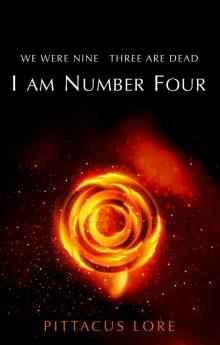 I Am Number Four
I Am Number Four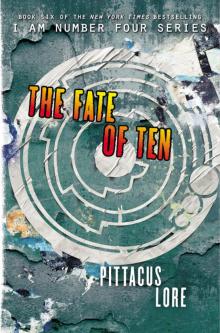 The Fate of Ten
The Fate of Ten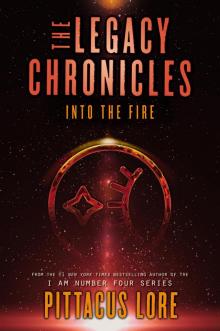 The Legacy Chronicles - Into the Fire
The Legacy Chronicles - Into the Fire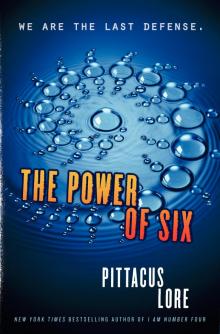 The Power of Six
The Power of Six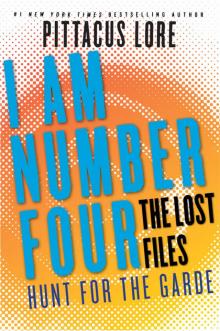 Hunt for the Garde
Hunt for the Garde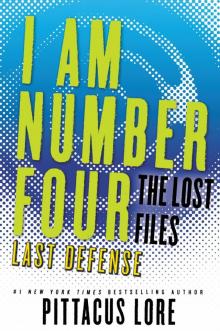 Last Defense
Last Defense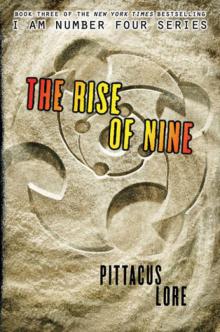 The Rise of Nine
The Rise of Nine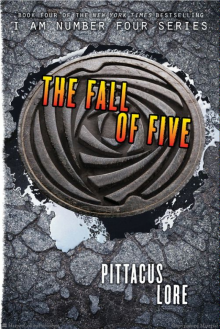 The Fall of Five
The Fall of Five The Fugitive
The Fugitive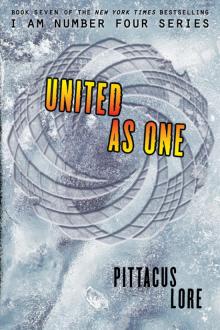 United as One
United as One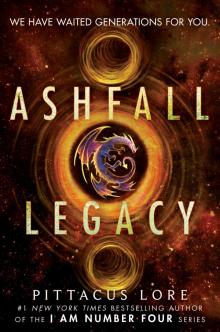 Ashfall Legacy
Ashfall Legacy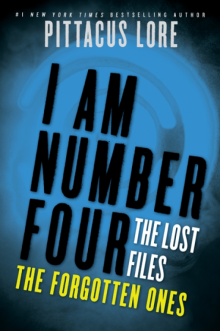 The Forgotten Ones
The Forgotten Ones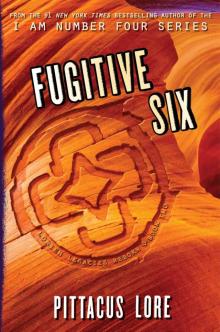 Fugitive Six
Fugitive Six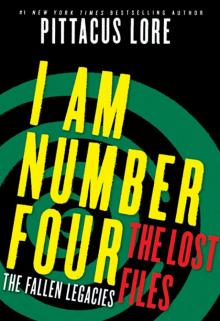 The Fallen Legacies
The Fallen Legacies![[Lorien Legacies 04.95] The Lost Files: Five's Betrayal Read online](http://i1.bookreadfree.com/28/lorien_legacies_04_95_the_lost_files_fives_betrayal_preview.jpg) [Lorien Legacies 04.95] The Lost Files: Five's Betrayal
[Lorien Legacies 04.95] The Lost Files: Five's Betrayal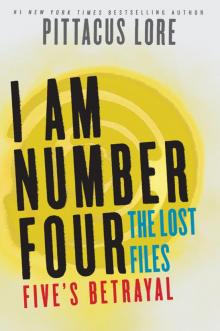 Five's Betrayal
Five's Betrayal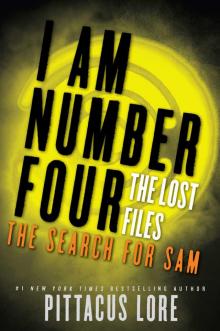 The Search for Sam
The Search for Sam![[Lorien Legacies 04.85] The Lost Files: The Forgotten Ones Read online](http://i1.bookreadfree.com/28/lorien_legacies_04_85_the_lost_files_the_forgotten_ones_preview.jpg) [Lorien Legacies 04.85] The Lost Files: The Forgotten Ones
[Lorien Legacies 04.85] The Lost Files: The Forgotten Ones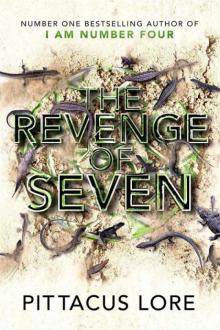 The Revenge of Seven
The Revenge of Seven![[Lorien Legacies 06.3] The Lost Files: Hunt for the Garde Read online](http://i1.bookreadfree.com/07/lorien_legacies_06_3_the_lost_files_hunt_for_the_garde_preview.jpg) [Lorien Legacies 06.3] The Lost Files: Hunt for the Garde
[Lorien Legacies 06.3] The Lost Files: Hunt for the Garde![[Lorien Legacies 04.0] The Fall of Five Read online](http://i1.bookreadfree.com/03/lorien_legacies_04_0_the_fall_of_five_preview.jpg) [Lorien Legacies 04.0] The Fall of Five
[Lorien Legacies 04.0] The Fall of Five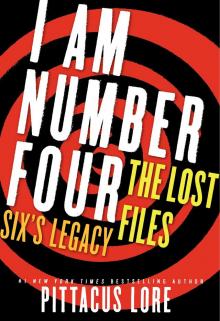 Nines Legacy
Nines Legacy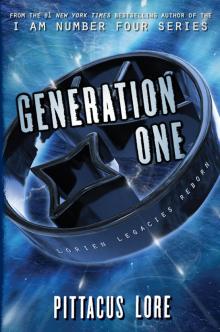 Generation One LLR
Generation One LLR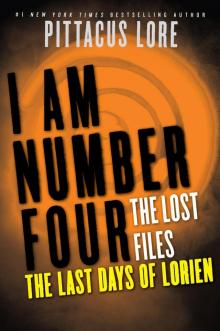 The Last Days of Lorien
The Last Days of Lorien![[Lorien Legacies 05.1] The Lost Files: The Fugitive Read online](http://i1.bookreadfree.com/i/03/14/lorien_legacies_05_1_the_lost_files_the_fugitive_preview.jpg) [Lorien Legacies 05.1] The Lost Files: The Fugitive
[Lorien Legacies 05.1] The Lost Files: The Fugitive![[Lorien Legacies 06.0] The Fate of Ten Read online](http://i1.bookreadfree.com/07/lorien_legacies_06_0_the_fate_of_ten_preview.jpg) [Lorien Legacies 06.0] The Fate of Ten
[Lorien Legacies 06.0] The Fate of Ten![[Lorien Legacies 06.2] The Lost Files: Last Defense Read online](http://i1.bookreadfree.com/08/lorien_legacies_06_2_the_lost_files_last_defense_preview.jpg) [Lorien Legacies 06.2] The Lost Files: Last Defense
[Lorien Legacies 06.2] The Lost Files: Last Defense![[Lorien Legacies 04.9] The Lost Files: Five's Legacy Read online](http://i1.bookreadfree.com/i/03/16/lorien_legacies_04_9_the_lost_files_fives_legacy_preview.jpg) [Lorien Legacies 04.9] The Lost Files: Five's Legacy
[Lorien Legacies 04.9] The Lost Files: Five's Legacy The Navigator
The Navigator![[Lorien Legacies 04.94] The Lost Files: Return to Paradise Read online](http://i1.bookreadfree.com/i/03/13/lorien_legacies_04_94_the_lost_files_return_to_paradise_preview.jpg) [Lorien Legacies 04.94] The Lost Files: Return to Paradise
[Lorien Legacies 04.94] The Lost Files: Return to Paradise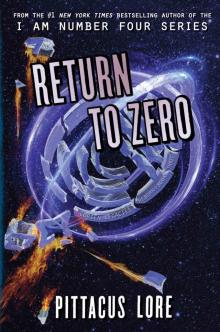 Return to Zero
Return to Zero![[Lorien Legacies 01.5] The Lost Files: The Fallen Legacies Read online](http://i1.bookreadfree.com/09/lorien_legacies_01_5_the_lost_files_the_fallen_legacies_preview.jpg) [Lorien Legacies 01.5] The Lost Files: The Fallen Legacies
[Lorien Legacies 01.5] The Lost Files: The Fallen Legacies![[Lorien Legacies 05.7] The Lost Files: The Guard Read online](http://i1.bookreadfree.com/i/03/13/lorien_legacies_05_7_the_lost_files_the_guard_preview.jpg) [Lorien Legacies 05.7] The Lost Files: The Guard
[Lorien Legacies 05.7] The Lost Files: The Guard![[Lorien Legacies 06.1] The Lost Files: Legacies Reborn Read online](http://i1.bookreadfree.com/i/03/13/lorien_legacies_06_1_the_lost_files_legacies_reborn_preview.jpg) [Lorien Legacies 06.1] The Lost Files: Legacies Reborn
[Lorien Legacies 06.1] The Lost Files: Legacies Reborn![[Lorien Legacies 03.0] The Rise of Nine Read online](http://i1.bookreadfree.com/10/lorien_legacies_03_0_the_rise_of_nine_preview.jpg) [Lorien Legacies 03.0] The Rise of Nine
[Lorien Legacies 03.0] The Rise of Nine![[Lorien Legacies 02.0] The Power of Six Read online](http://i1.bookreadfree.com/i/03/14/lorien_legacies_02_0_the_power_of_six_preview.jpg) [Lorien Legacies 02.0] The Power of Six
[Lorien Legacies 02.0] The Power of Six![[Lorien Legacies 04.6] The Lost Files: The Search for Sam Read online](http://i1.bookreadfree.com/i/03/17/lorien_legacies_04_6_the_lost_files_the_search_for_sam_preview.jpg) [Lorien Legacies 04.6] The Lost Files: The Search for Sam
[Lorien Legacies 04.6] The Lost Files: The Search for Sam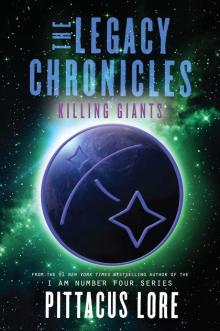 The Legacy Chronicles: Killing Giants
The Legacy Chronicles: Killing Giants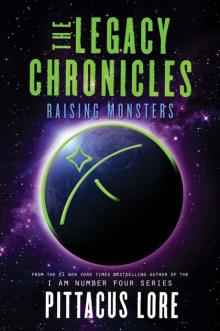 The Legacy Chronicles: Raising Monsters
The Legacy Chronicles: Raising Monsters![[Lorien Legacies 05.4] The Lost Files: The Navigator Read online](http://i1.bookreadfree.com/i/03/17/lorien_legacies_05_4_the_lost_files_the_navigator_preview.jpg) [Lorien Legacies 05.4] The Lost Files: The Navigator
[Lorien Legacies 05.4] The Lost Files: The Navigator![[Lorien Legacies 07.0] United as One Read online](http://i1.bookreadfree.com/i/03/18/lorien_legacies_07_0_united_as_one_preview.jpg) [Lorien Legacies 07.0] United as One
[Lorien Legacies 07.0] United as One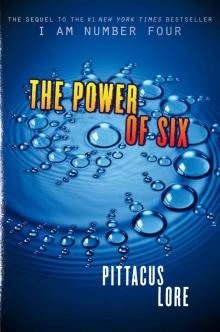 The Power of Six (I Am Number Four)
The Power of Six (I Am Number Four)![[Lorien Legacies 03.5] The Lost Files: Nine's Legacy Read online](http://i1.bookreadfree.com/i/03/18/lorien_legacies_03_5_the_lost_files_nines_legacy_preview.jpg) [Lorien Legacies 03.5] The Lost Files: Nine's Legacy
[Lorien Legacies 03.5] The Lost Files: Nine's Legacy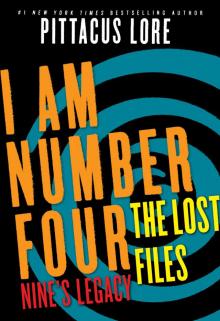 I Am Number Four: The Lost Files: Nine’s Legacy
I Am Number Four: The Lost Files: Nine’s Legacy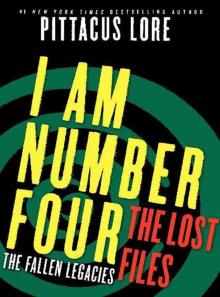 The Lost Files: The Fallen Legacies (i am number four)
The Lost Files: The Fallen Legacies (i am number four)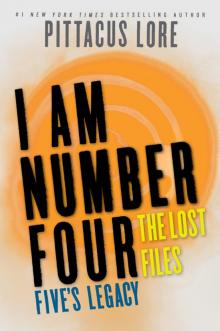 Five's Legacy
Five's Legacy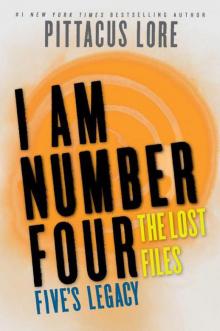 I Am Number Four: The Lost Files: Five's Legacy
I Am Number Four: The Lost Files: Five's Legacy![[Lorien Legacies 05.0] The Revenge of Seven Read online](http://i1.bookreadfree.com/i1/03/30/lorien_legacies_05_0_the_revenge_of_seven_preview.jpg) [Lorien Legacies 05.0] The Revenge of Seven
[Lorien Legacies 05.0] The Revenge of Seven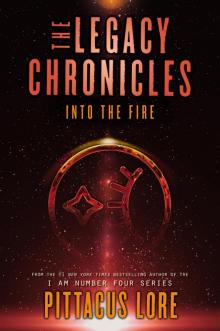 The Legacy Chronicles
The Legacy Chronicles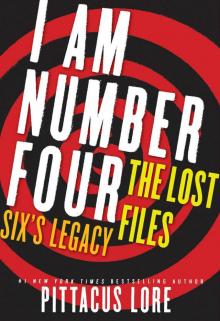 The Lost Files: Six's Legacy
The Lost Files: Six's Legacy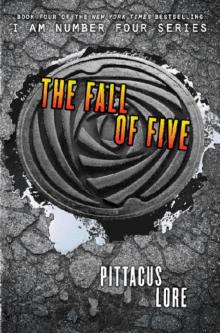 The Fall of Five (I Am Number Four)
The Fall of Five (I Am Number Four)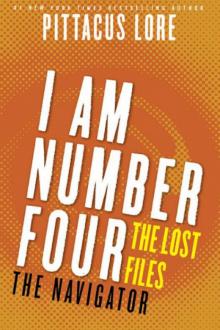 The Lost Files: The Navigator
The Lost Files: The Navigator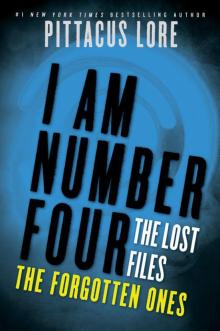 I Am Number Four: The Lost Files: The Forgotten Ones
I Am Number Four: The Lost Files: The Forgotten Ones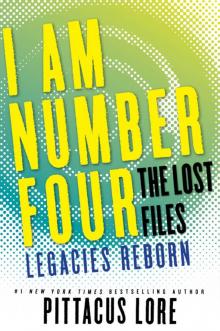 Legacies Reborn
Legacies Reborn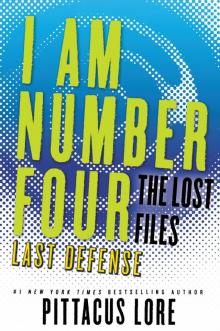 I Am Number Four: The Lost Files: Last Defense
I Am Number Four: The Lost Files: Last Defense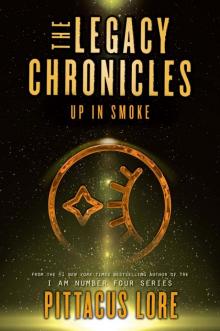 The Legacy Chronicles_Up in Smoke
The Legacy Chronicles_Up in Smoke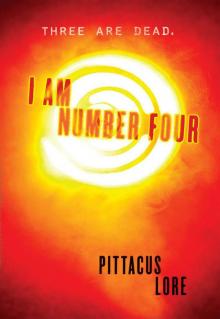 I Am Number Four ll-1
I Am Number Four ll-1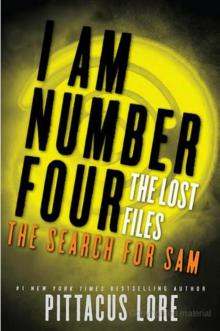 The Search for Sam lltlf-4
The Search for Sam lltlf-4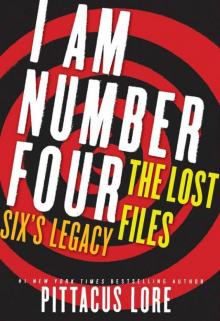 The Lost Files: Six's Legacy (lorien legacies)
The Lost Files: Six's Legacy (lorien legacies)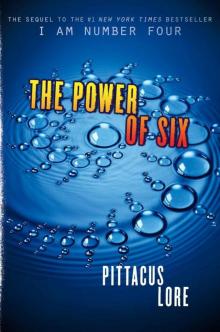 The Power of Six tll-2
The Power of Six tll-2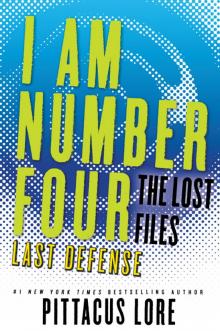 I Am Number Four: The Lost Files #14
I Am Number Four: The Lost Files #14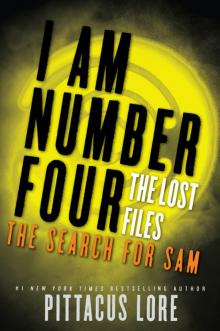 I Am Number Four: The Lost Files: The Search for Sam
I Am Number Four: The Lost Files: The Search for Sam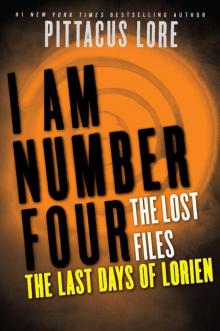 I Am Number Four: The Lost Files: The Last Days of Lorien
I Am Number Four: The Lost Files: The Last Days of Lorien